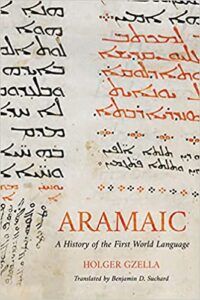 Although we commonly say that the Old Testament was written in Hebrew, we know that portions of Ezra and Daniel were written in Aramaic. We also know that there are a few Aramaic words in the New Testament (Abba, Cephas, Maranatha, etc.). Benjamin D. Suchard has translated Holger Gzella’s Aramaic: A History of the First World Language (2017) and Eerdmans has recently published it (2021). You may not be as into languages as I am, but I think this is a fascinating book. The most important chapter, of course, is chapter 4, “Aramaic in the Bible and Early Judaism.”
Although we commonly say that the Old Testament was written in Hebrew, we know that portions of Ezra and Daniel were written in Aramaic. We also know that there are a few Aramaic words in the New Testament (Abba, Cephas, Maranatha, etc.). Benjamin D. Suchard has translated Holger Gzella’s Aramaic: A History of the First World Language (2017) and Eerdmans has recently published it (2021). You may not be as into languages as I am, but I think this is a fascinating book. The most important chapter, of course, is chapter 4, “Aramaic in the Bible and Early Judaism.”
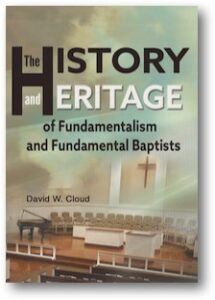 If you are looking for a book by an Independent Fundamental Baptist that “contains an extensive history of Fundamentalism in general and of fundamental Baptists in particular,” I recommend The History and Heritage of Fundamentalism and Fundamental Baptists (Way of Life, 2020), by David W. Cloud. The main sections of the book are 1. Interdenominational Fundamentalism, 2. Metropolitan Tabernacle, London, 3. Northern Fundamental Baptists, 4. Southern Fundamental Baptists, 5. Where Are Fundamental Baptists Today?, 6. New Testament Churches in the Last Days. The book is not on Amazon, but can be ordered from Way of Life Literature, www.wayoflife.org.
If you are looking for a book by an Independent Fundamental Baptist that “contains an extensive history of Fundamentalism in general and of fundamental Baptists in particular,” I recommend The History and Heritage of Fundamentalism and Fundamental Baptists (Way of Life, 2020), by David W. Cloud. The main sections of the book are 1. Interdenominational Fundamentalism, 2. Metropolitan Tabernacle, London, 3. Northern Fundamental Baptists, 4. Southern Fundamental Baptists, 5. Where Are Fundamental Baptists Today?, 6. New Testament Churches in the Last Days. The book is not on Amazon, but can be ordered from Way of Life Literature, www.wayoflife.org.
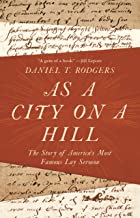 We have all heard America described as a city on a hill. The phrase comes from John Winthrop’s (1588-1649) “A Model of Christian Charity.” It is based on Matthew 5:14: “Ye are the light of the world. A city that is set on an hill cannot be hid.” If you have the time to do any reading in early American religious history, As a City on a Hill: The Story of America’s Most Famous Lay Sermon (Princeton, 2018) is a good supplement to whatever text you are reading.
We have all heard America described as a city on a hill. The phrase comes from John Winthrop’s (1588-1649) “A Model of Christian Charity.” It is based on Matthew 5:14: “Ye are the light of the world. A city that is set on an hill cannot be hid.” If you have the time to do any reading in early American religious history, As a City on a Hill: The Story of America’s Most Famous Lay Sermon (Princeton, 2018) is a good supplement to whatever text you are reading.
Darby was one of the founders of the Plymouth Brethren movement.Two of the most notable brethren are F. F. Bruce (1910-1990) and Harry A. Ironside (1876-1951). I have two books in my library on the Plymouth Brethren: My People: The History of Those Christians Sometimes Called Plymouth Brethren (Harold Shaw, 1995), by Robert H. Baylis, and The Plymouth Brethren (Oxford, 2018), by Massimo Introvigne. The former book contains 336 pages, including over 100 illustrations and photographs. The latter book is much smaller (141 pgs.), but is the latest research on the subject.
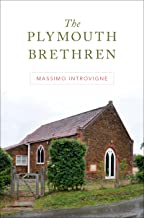
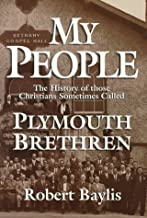
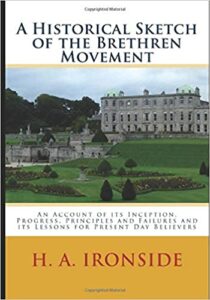
I am embarrassed to say that I have not read and do not own H. A. Ironside’s A Historical Sketch of the Brethren Movement: An Account of its Inception, Progress, Principles and Failures and its Lessons for Present Day Believers (Zondervan, 1942). I would read it before the two other books.
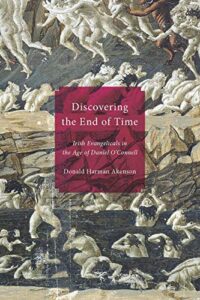 I have many unusual and relatively unknown books in my library that are extremely valuable. Two examples are: Discovering the End of Time: Irish Evangelicals in the Age of Daniel O’Connell (McGill-Queen’s University Press, 2016), and Exporting the Rapture: John Nelson Darby and the Victorian Conquest of North-American Evangelicalism (Oxford, 2018), both by Donald Harman Akenson. We all know, or we should know, about John Nelson Darby (1800-1882), and how he popularized dispensationalism
I have many unusual and relatively unknown books in my library that are extremely valuable. Two examples are: Discovering the End of Time: Irish Evangelicals in the Age of Daniel O’Connell (McGill-Queen’s University Press, 2016), and Exporting the Rapture: John Nelson Darby and the Victorian Conquest of North-American Evangelicalism (Oxford, 2018), both by Donald Harman Akenson. We all know, or we should know, about John Nelson Darby (1800-1882), and how he popularized dispensationalism 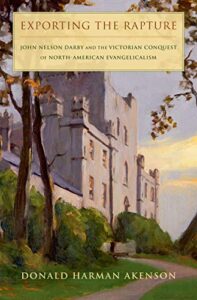 years before the Scofield Reference Bible (not invented it as many of the Reformed falsely assert). Although there is much in these books about Darby and his teachings and writings, they primarily explore the religious and cultural environment in which Darby lived in Ireland. These books are absolutely essential for understanding the life and times of John Nelson Darby.
years before the Scofield Reference Bible (not invented it as many of the Reformed falsely assert). Although there is much in these books about Darby and his teachings and writings, they primarily explore the religious and cultural environment in which Darby lived in Ireland. These books are absolutely essential for understanding the life and times of John Nelson Darby.
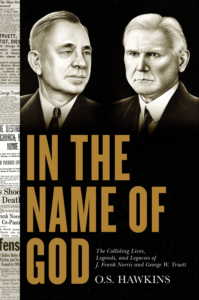 J. Frank Norris (1877-1952) pastored the First Baptist Church of Ft. Worth while George W. Truett (1867-1944) pastored the First Baptist Church of Dallas. Norris left the SBC while Truett remained in. Broadman & Holman (B & H) Academic is announcing the publication on September 1 of In the Name of God: The Colliding Lives, Legends, and Legacies of J. Frank Norris and George W. Truett, by O. S. Hawkins. I will have more to say about this publisher at a later date. This looks to be a fascinating book if you are interested in Baptist history. You can preview the book here.
J. Frank Norris (1877-1952) pastored the First Baptist Church of Ft. Worth while George W. Truett (1867-1944) pastored the First Baptist Church of Dallas. Norris left the SBC while Truett remained in. Broadman & Holman (B & H) Academic is announcing the publication on September 1 of In the Name of God: The Colliding Lives, Legends, and Legacies of J. Frank Norris and George W. Truett, by O. S. Hawkins. I will have more to say about this publisher at a later date. This looks to be a fascinating book if you are interested in Baptist history. You can preview the book here.

I mentioned in a previous post my favorite quote by H. L. Mencken: “Puritanism—The haunting fear that someone, somewhere, may be happy.” If you want to see what happened when Puritans gained influence over and control of the government, then I highly recommend England’s Culture Wars: Puritan Reformation and its Enemies in the Interregnum, 1649-1660 (Oxford, 2012), by Bernard Capp. Part II is the meat of the book, with chapters on:
- Sins against God: Swearing and the Sabbath
- The Puritan Parish
- Puritans and Sex
- Drink and Disorder
- Worldly Pleasures: Dress, Music, Dancing, Art
- Worldly Pleasures: Plays, Shows, Sports
Capp documents how Puritan magistrates and ministers “drew up a harsh penal code against blasphemers, sexual offenders, and other deviants.” They “enforced church attendance, suppressed unlawful sports and disorderly alehouses, whipped fornicators, ducked scolds, and fined blasphemers.” If you are in favor of laws like this, then you have no concept of the nature of New Testament Christianity. My forthcoming article “Puritanism Then and Now” goes into more detail on Capp’s book and shows that Puritanism is alive and well in the twenty-first century.